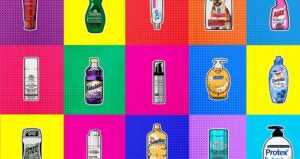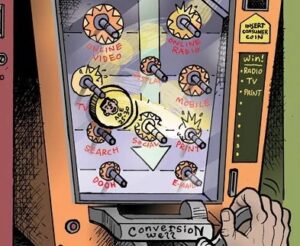 Jerry Neumann is a partner in Neu Venture Capital, a New York City-based seed-stage investor group with investments in 33Across, Metamarkets, PerformLine, The Trade Desk, Optim.al, Media Armor, and Yieldbot among others.
Jerry Neumann is a partner in Neu Venture Capital, a New York City-based seed-stage investor group with investments in 33Across, Metamarkets, PerformLine, The Trade Desk, Optim.al, Media Armor, and Yieldbot among others.
Jokes all start with one of a few stock set-ups. “A man walked into a bar.” But the punchlines are all different. VC pitches are the opposite: the set-ups are all different, but the punchlines are all the same.
Stop me if you’ve heard this one before. “We enable the half of advertising that is not yet online: brand advertising!” Been hearing that one for more than ten years now. It permeates the hopes and dreams of every adtech entrepreneur and investor. And still no one has cracked the code.
My friend Tim Hanlon got together with Tim Chang a few weeks ago on AdExchanger to offer some reasons why this might be. Worth your time, but here’s the tl;dr:
- No standards or consistent measures of “success” other than outdated or inadequate metrics like CPM and CTR;
- Limited real-time intelligence;
- Unsuitable display ad formats; and
- Lack of creativity in formats.
The prize is huge. As Tim and Tim point out, two-thirds of advertising spending is brand advertising, but online only one quarter is. In fact, if brand advertising dollars moved online in the same proportion that sales advertising has, it would almost exactly close the famous gap between time spent online and ad dollars spent online. The $50 billion gap that Mary Meeker mentions is exactly equal to the missing brand spend.
I understand the urgent desire to figure out online brand advertising. If we did, we’d more than double the online advertising market. Online pubs would rejoice, online marketing pros would have more excuses to go out drinking with prospective clients, my portfolio value would quintuple overnight. Good things all. And I appreciate the optimism that Tim and Tim have, their willingness to keep suggesting solutions. But I think it’s the triumph of hope over experience. Each of the proposed solutions has been tried, and tried and tried. And still we believe that this time it’s different, that this year an online branding play will work. Online video maybe, or Facebook, or Pinterest. Every new company is touted as the one that will make branding work online.
But what if we try all these things, like we’ve tried everything before, and they don’t work? What if we eliminate all the possibilities and what remains is… nothing? I’m going to be branded a heretic for saying this, but what if online just doesn’t work for branding?
I mean, not to be defeatist, but we understand branding pretty well. Marketers have been creating brands nigh on one hundred years now; it’s not a black art. And the solutions I hear, even Tim and Tim’s, are not untried. More, they are not the things that make brand advertising effective in other media. I don’t buy that these are the solutions. I think it’s distinctly possible that there are no solutions.
Maybe the medium itself is antithetical to the way brands are built. Like direct mail, maybe the very fact of delivering your message in a low budget, specifically targeted way cannot in any way build a brand. Brands attempt to exist autonomously, they are objects of desire, they want to distinguish what otherwise is indistinguishable. The psychological processes of branding are inimical to the idea that the brand has been chosen for you. Brands do not choose you; you choose brands. Brands are aloof, they aspire to be the Platonic ideal, their competitors just shadows.
Perhaps. I mean, I could be wrong. It could be that even though we sell ourselves to clients as brand-building geniuses, we don’t know what we’re doing; that we’re groping in the dark, throwing random darts and just haven’t hit the bulls-eye yet. We could be a bunch of monkeys at typewriters and Shakespeare will just roll on out one day. Could be. But it seems unlikely.
What if I’m right? What if online branding is a mug’s game? If it is, it won’t be too much longer before marketers get wise and just stop listening to online branding pitches. Maybe they already have. Maybe they never did listen to them. What’s the fallback plan? How do we go about getting the brand advertising dollars if online brand advertising doesn’t work? What can we do that will cause brand advertisers to move their branding dollars out of advertising altogether into some other online channel? Online display media buying is our little world. Branding is The Show. How do we disrupt branding?
Follow Jerry Neumann (@ganeumann) and AdExchanger.com (@adexchanger) on Twitter.













